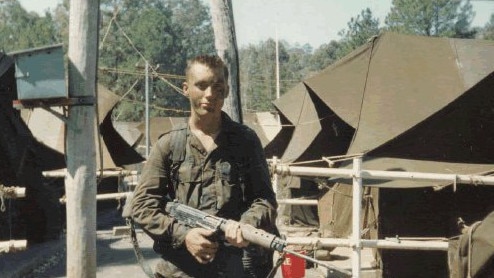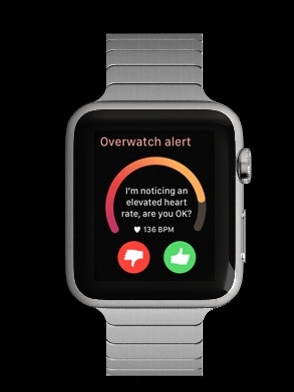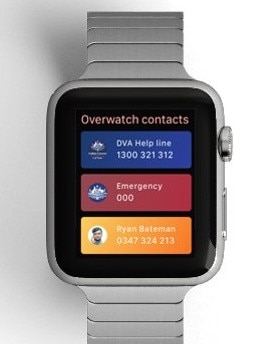A text saved my life, and it could save others
NOT asking for help nearly killed me, writes Chris Rhyss Edwards. Now I want to make it easier for others to get help, even when they’re not able to ask for it themselves.
Rendezview
Don't miss out on the headlines from Rendezview. Followed categories will be added to My News.
I CAN honestly say that a text message saved my life.
That life changing SMS arrived as I stood drunkenly atop a seven-story building, doing the maths in my head if the drop would be enough to kill me. I’d decided I wanted to die on my year-long honeymoon after my marriage had grown increasingly toxic. It’s fair to say I had hit my lowest point.
As a former soldier, it’s more than a little humbling to admit that I still don’t know if I would have jumped had I not been interrupted. When my phone buzzed, it snapped me out of my dangerous state of mind. Coincidently, it was a friend who was checking to see if I was OK as he noticed something wasn’t right. I was instantly reminded that I wasn’t alone, that people cared about my wellbeing, and that maybe death wasn’t the only option.
I’ve since committed my life and savings to helping my fellow veterans and first-responders deal with stress and depression. Having spent the 90s in uniform as a combat engineer and peacekeeper, I can see the unintentional burden of service on the mental wellbeing of the men and women who serve this country. It’s damage that often lasts a lifetime.
Far too many of us leave the military with physical injuries from the daily challenges we face. I’d argue that just as many of us leave with mental injuries or illness. We don’t complain. It’s simply the cost of doing business. We try our best to get on with life. The problem is, we are not asking for help, and that’s what’s killing us.
A veteran takes their own life every four days in Australia. What’s far more saddening is that for every death, 10 to 15 other veterans have planned to, or tried to, end their lives. I’m one of them.

After leaving the military, I began to suffer bouts of post-traumatic stress disorder (PTSD) and depression, with some episodes lasting several days. I kept it mostly hidden from view, as many of us do, but over the years it began to sneak out into the open. At times, going to work was nearly impossible. It was most apparent in my relationships. Having grown up in a household rife with domestic violence and abuse, I’d learned to ‘survive’ by emotionally shutting down when things got too intense. Suffice to say, this isn’t a sound strategy.
When things reached a peak the day I almost took my own life, I was too deep in a dark place to think straight, but that errant SMS changed my state in an instant. This led me to start thinking about how I could use technology to help others struggling with their own mental health.
I came up with the idea to develop an app that would allow veterans experiencing stress, depression and PTSD to become aware of their stress and immediately be able to find support. The idea gained momentum when I was selected to be part of HCF Catalyst. This is an accelerator program supported by health insurance fund HCF and Slingshot. It helps healthcare start-ups become full businesses in 12 weeks.
In a matter of weeks I had the framework for a Minimum Viable Product, been awarded a research and development grant, won support from Federal Ministers and Senators — but most importantly — established a team of mentors to support me in bringing the Soldier.ly app to life.
These days, I’m not too proud to admit that the social stigma attached to openly talking or seeking help for mental illness was what almost killed me. It’s this stigma that claims far too many lives of veterans and first-responders, and even more lives of civilian men. In Australia, the leading cause of death for men aged 15 to 44 is suicide, which is astounding in ‘the lucky country’. It’s heartbreaking to consider how many of these boys and men would be alive today if they’d felt safe to admit they were a bit lost, broken or lonely?


That thinking lead to one of the key ‘aha’ moments during the HCF Catalyst program. We decided to use Fitbit’s smartwatch technology to monitor sleep schedules and heart rate to detect spikes in stress, or sustained periods of stress. Once stress is detected, our app goes through a triage process of either guiding the user through a calming breathing exercise, automatically reaching out to people they’ve invited to be part of their support network, or if the stress level is critical, automatically connecting them with an emergency support hotline.
The Soldier.ly app is a world-first stress management app built exclusively to work on Fitbit smartwatches. But as smart as our technology is, it’s the social connection and support piece of this project — where mates support their mates — that we know will be the critical success factor.
We expect to roll out the free Soldier.ly app to veterans and first-responders in early 2019, and expect to release a version for the public not long after. We’ll be able to reach veterans in need from the generous support of the government and various ex-service organisation partners. We’ll be able get it out to the public thanks to the continued public support of the HCF Catalyst program team, most notable of whom is HCF’s wonderful CEO Sheena Jack.
It’s saddening that living with stress has become the norm. It’s impacting the lives of two million Australians, with chronic stress now being linked to the six leading causes of death. That’s why our mission at Soldier.ly is to do what the army taught us to do best, push on, never quit.
We’re committed to shifting the narrative from mental illness to mental wellness in the hopes of encouraging more people to speak up and reach out to their mates, because that’s the ANZAC spirit in action and what Australia was once famous for.
If you are experiencing depression or are suicidal, or know someone who is, help is available.
Lifeline: 13 11 14
Beyond Blue: 1300 224 636


